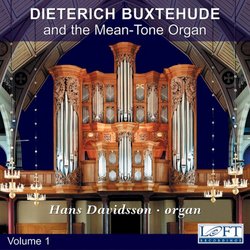A Revelation!
Giordano Bruno | Wherever I am, I am. | 01/15/2008
(5 out of 5 stars)
"One of my beloved uncles is a Lutheran church organist in Minnesota. He and I have had numerous battles over the question of whether mammoth organs, the kind with four manuals and 50+ stops, should be considered musical instruments or WDMs of holy war. The problem for my ears has been the raging discord I hear in the sustained chords, the wolf tones, the beats, the acoustical wobbles and warbles resulting from the built-in flaws of modern equal temperament. Chamber organs are a separate story, and the renaissance in small historical organ-building of the past 50 years has been crucial to the revival of such great composers as Biber and Schmelzer. Equal temperament is fundamental to the history of the modern symphony orchestra and to the whole grand repertoire of the grand piano, but it doesn't work universally. String players and very proficient choristers often "bend" it by ear, something not possible on a keyboard instrument.
Enter Hans Davidsson, the founder of the Göteborg, Sweden, Organ Art Center, and my uncle's hero. Mr. Davidsson has achieved a miracle of congregational finance, the construction of a four-manual Baroque organ based on those of Arp Schnitger in the 17th C, tuned precisely as the organs Buxtehude himself played upon, in quarter-comma mean-tone temperament. To quote Davidsson himself: "Because of the sustained nature of the organ sound and the expectation of stark contrast between consonance and dissonance, the mean-tone organ with pure major thirds was preferred. It was a prerequisite for pure harmonic intonation in ensemble music..." Those pure major triads do make a heap of difference, producing a clarity and melodiousness that even people who don't know the difference between a musical third and fifth of vodka should be able to hear.
All of this would be mere scholarly quibbling if the performance were not up to snuff, but Hans Davidsson is a master of his instrument, rhythmically precise and very tasteful in his choices of register. His organ never smothers the music, as some do. Buxtehude's fame as a composer and improviser on the organ was such that JS Bach walked all the way to Lubeck to hear him play. That fame has never totally faded; Lutheran organists have been playing Buxtehude's preludes and chorales all along. This CD is the first chance most of us will have had to hear the music as Buxtehude and his congregations heard it. If you've always had secret reservations about organ music, I urge you to give it another chance. My uncle and his mentor have converted me."
Revelatory
S. T. Hickcox | Baton Rouge, LA USA | 08/12/2009
(5 out of 5 stars)
"I don't follow exactly the explanations given for the significance of mean-toned vs tempered, but, having minored in physics many decades ago, I get the gist of it.
The proof is in the listening and this CD is stunning. The clarity of the sound plus the genius of the music and the extraordinary skills of the organist combine to give us a superb CD."


 Track Listings (18) - Disc #1
Track Listings (18) - Disc #1